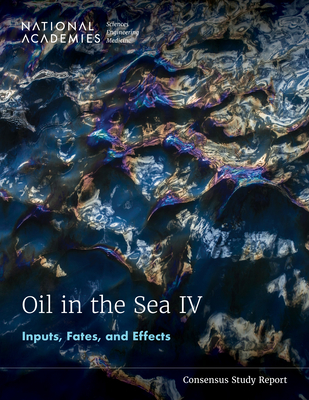Oil in the Sea IV: Inputs, Fates, and Effects

Oil in the Sea IV: Inputs, Fates, and Effects
Oil and natural gas represent more than 50 percent of the worldwide energy supply, with high energy demand driven by population growth and improving standards of living. Despite significant progress in reducing the amount of oil in the sea from consumption, exploration, transportation, and production, risks remain. This report, the fourth in a series, documents the current state-of-knowledge on inputs, fates and effects of oil in the sea, reflecting almost 20 additional years of research, including long-term effects from spills such as the Exxon Valdez and a decade-long boom in oil spill science research following the Deepwater Horizon oil spill.
The report finds that land-based sources of oil are the biggest input of oil to the sea, far outweighing other sources, and it also notes that the effects of chronic inputs on the marine environment, such as land-based runoff, are very different than that from an acute input, such as a spill. Steps to prevent chronic land-based oil inputs include reducing gasoline vehicle usage, improving fuel efficiency, increasing usage of electric vehicles, replacing older vehicles. The report identifies research gaps and provides specific recommendations aimed at preventing future accidental spills and ensuring oil spill responders are equipped with the best response tools and information to limit oil's impact on the marine environment.
PRP: 585.00 Lei
Acesta este Prețul Recomandat de Producător. Prețul de vânzare al produsului este afișat mai jos.
526.50Lei
526.50Lei
585.00 LeiLivrare in 2-4 saptamani
Descrierea produsului
Oil and natural gas represent more than 50 percent of the worldwide energy supply, with high energy demand driven by population growth and improving standards of living. Despite significant progress in reducing the amount of oil in the sea from consumption, exploration, transportation, and production, risks remain. This report, the fourth in a series, documents the current state-of-knowledge on inputs, fates and effects of oil in the sea, reflecting almost 20 additional years of research, including long-term effects from spills such as the Exxon Valdez and a decade-long boom in oil spill science research following the Deepwater Horizon oil spill.
The report finds that land-based sources of oil are the biggest input of oil to the sea, far outweighing other sources, and it also notes that the effects of chronic inputs on the marine environment, such as land-based runoff, are very different than that from an acute input, such as a spill. Steps to prevent chronic land-based oil inputs include reducing gasoline vehicle usage, improving fuel efficiency, increasing usage of electric vehicles, replacing older vehicles. The report identifies research gaps and provides specific recommendations aimed at preventing future accidental spills and ensuring oil spill responders are equipped with the best response tools and information to limit oil's impact on the marine environment.










